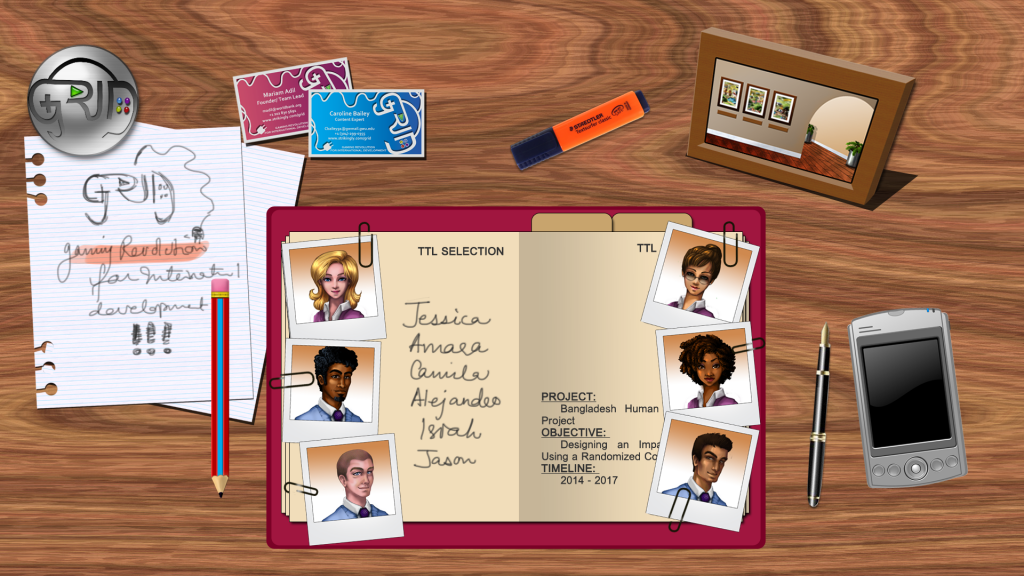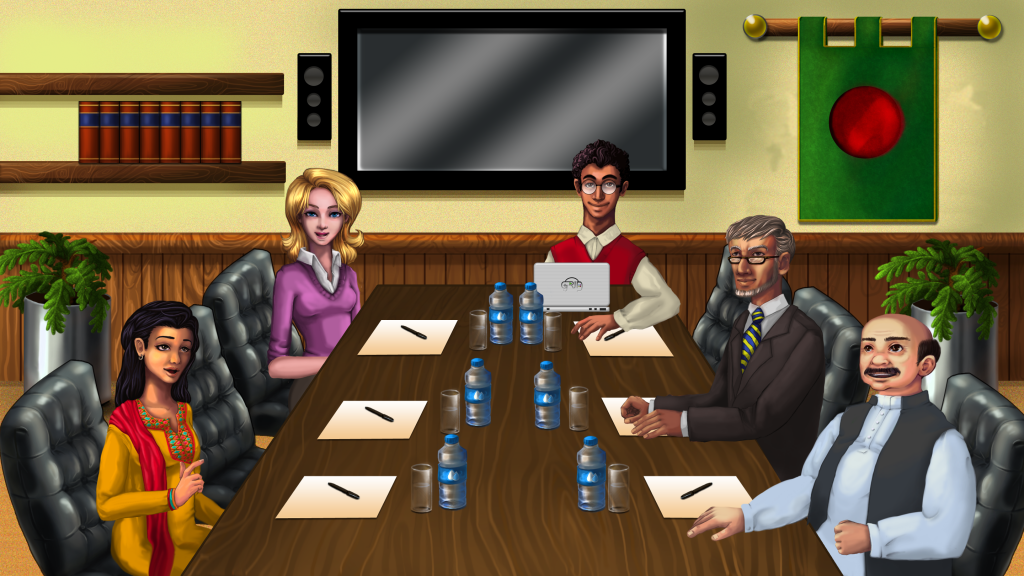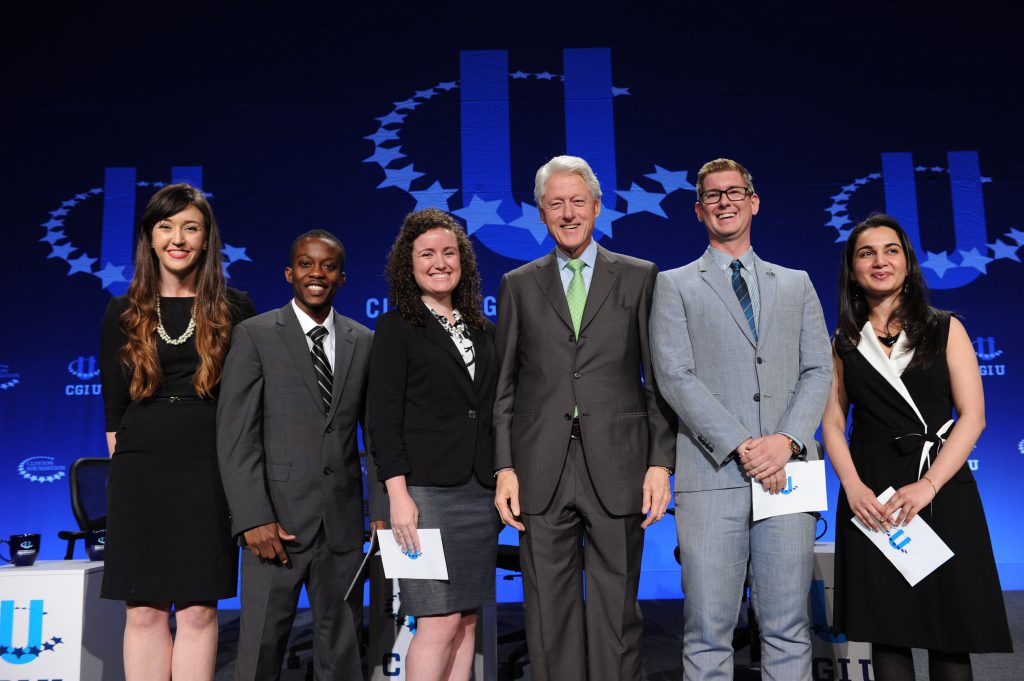In the wake of last year’s Gamergate debacle – a damaging campaign against women in the gaming industry – the global game industry is still a male-dominated world.
Young entrepreneur Mariam Adil, however, is blazing a new trail in Pakistan’s social gaming industry, shattering stereotypes, gender barriers and the glass ceiling along the way as well.
Adil is the founder of Gaming Revolution for International Development (GRID), a game development startup that designs low-cost digital games that inspire social change. Launched through the Clinton Global Initiative University, GRID revolutionizes the practice of international development by introducing games as development solutions that simulate challenges in designing, implementing and monitoring projects.
Her game, Randomania, allows development-sector professionals to think about the challenges of evaluating development projects and offers scenarios they may face as a result of their policy decisions. Stereowiped, on the other hand, tackles racial, gender and ethnic stereotypes by engaging people to confront and break stereotypes through a fun, yet educational mahjong tiles-inspired game.
In addition to developing and expanding her social venture, she is also an economist (consultant) with the Africa Education Global Practice at the World Bank and getting her MA in International Development at the George Washington University. We spoke to the inspiring entrepreneur about making her break in the male-dominated industry and the remarkable impact of gaming for social good:
Elan: What made you decide to enter the world of gaming and entrepreneurship?
Mariam Adil: GRID lies at the nexus of three of my passions, education, technology innovation and behavioral economics. While the world of gaming and entrepreneurship is new to me, the idea of “games as development solutions” feels like a cause that I am deeply familiar to and that I have been pulled towards for a very long time. GRID allows me to be the thinker and the do-er at the same time, it is what makes entrepreneurship awesome.
Elan: Tell us about GRID. Why do you think this is such an important venture both national and globally?
MA: There are a billion people living under $1.25/day and half a billion playing video games for at least one hour every day. The challenge of fighting poverty is huge, but so is the potential of video games.
International development interventions over the years have suffered from the last mile problem. That last mile that prevents the use of oral salts for treating diarrhea, of bed nets for the prevention of malaria or discourages parents from allowing girls to receive sex education. It is grounded in problems of information asymmetry and behavioral constraints, where awareness of development interventions is patchy and communication campaigns are unable to create a lasting impression for successful project take-up and implementation.
It is that last step where the science of social change breaks down and the art of change takes center stage. Games can play a critical role in making the “last” mile problem a “first” opportunity. Technology innovations like games can be used to trigger social dialogue and change behaviors.
At GRID, we aim to leverage this potential and make games that can help fight the challenge of poverty, hunger, social exclusion and disease.
Elan: What made you decide to make global development the niche market for your tech startup?
MA: I had my ‘aha moment’ in a development economics seminar in 2013, when I pictured a SimCity-like game, but one where you design development projects instead of building cities.
I was always intrigued by the role that technology can play in helping us solve the problems around us in a more meaningful way and GRID was my way of finding out. Having worn the international development practitioner hat for five years, I am aware of the needs of the sector and therefore feel like it is a natural niche for me.
Elan: Why do you think gaming is a good way to advance social good and social progress?
MA: Games have the power of what I like to call “the three I’s” − they can interact with the players in an iterative way to inspire change. Games can build capacity, raise awareness, promote dialogue and inspire behavior change to put the wheels of change in motion. I see GRID games as a catalyst for development projects.
Dialogue around serious social issues such as open defecation, racial stereotyping or birth control can be tricky to initiate and sustain. These issues are so deeply inscribed in social constructs, that few people question them, and even the ones that do, find it difficult to engage in a dialogue around them.
Video games can target these social constructs and prompt individuals to challenge them in a fun way. Games can bring the dialogue to the comfort zone of people, specifically youth, and leverage the convenience of technology and interactive nature of video games to promote social change.
 Elan: You are currently developing a business, working at the World Bank and getting your Masters in international development. What has been your biggest lesson that motivated you to push further and strive harder in your career?
Elan: You are currently developing a business, working at the World Bank and getting your Masters in international development. What has been your biggest lesson that motivated you to push further and strive harder in your career?
MA: There is something about doing what you love that makes the doing part easy. It helps that my work, studies and social venture have overlaps and so many a times one inspires the other, but mostly it is simply about the fact that I absolutely love what I do and I will not have it any other way.
Elan: What are some of the challenges you have faced so far? How did you overcome them?
MA: Entrepreneurship can be an uphill battle; finding the right people and mentors, learning how to pitch your idea, identifying the gaps that you can solve, finding your comparative advantage, having a plan and making sure that it all aligns with your moral compass, are tough but important goals.
No one person can do it alone, cliché as it may sound, you need your family and friends standing by you, because while money is important, a support system is absolutely critical. I had my support system rooting for me.
Elan: What impact do you think games like Randomania can have in the field of global development?
MA: Randomania is a training game that allows development practitioners to think about the challenges of evaluating projects and designing randomized control trials. The game takes the player through the different scenarios they can face in the field and walks them through a decision tree based on the actions of the player. It is what creates the bridge between the science and art of international development.
The game was built for a technical audience (i.e: researchers and policy makers) and has been incorporated as part of WB workshops on monitoring and evaluating projects.
Several professions use games and simulations for training, be it pilots or doctors, and there is a large space for more training games to be developed for capacity building of policy makers and development practitioners in international development.
 Elan: One of your games, Stereowiped, engages people in confronting racial, gender and ethnic stereotypes through a memory-tile play structure. What inspired you to launch this game?
Elan: One of your games, Stereowiped, engages people in confronting racial, gender and ethnic stereotypes through a memory-tile play structure. What inspired you to launch this game?
MA: StereoWiped comes from a place very close to my heart.
Belonging to a country burdened by a surge in extremism and violence, it pains me to know that the world knows so little of the many faces, the many voices, the many colors of Pakistan. I want to break the stereotypes associated with Pakistanis, but also with Americans, Kenyans, Colombians, women, gays, homeless people or African-Americans. I want to make a contribution towards promoting tolerance and celebrating diversity.
Inspired by the design of mahjong tiles, StereoWiped challenges the player to match portions of a stereotype such as “ I am a girl” and “I like pink” and then breaks them using a statistic, such as 1 out of 3 girls around you like blue more than pink. The idea is to keep having fun, but raise awareness about stereotypes in the process.
Elan: Many people say social gaming is not as effective and has run its course. What are your thoughts on the social gaming industry?
MA: I think we have only discovered the tip of the iceberg of social-good games.
We have seen games make waves in the fields of education and health, thanks to thought leaders like Jane McGonigal and Asi Burak, but we are only now gaining momentum.
We have seen games for the western world, but what about the people who need them the most, the poorest of the poor. What is the role that games can play in helping them make better decisions, about their environment, their money, their children and their futures? That is a horizon waiting to be explored and the time is now to get started.
Elan: What do you think is the biggest problem that faces Pakistan’s gaming industry? What changes would you like to see in the next 10 years?
MA: I do not consider myself an expert at the Pakistani gaming industry but I know that we do not have the enabling environment that can do justice to the immense talent that the country offers.
Being based in Washington, D.C, I see a strong ecosystem of incubators, accelerators, investors and mentors that are critical for nurturing a budding industry. The gaming industry in Pakistan is in its infancy, but shows a very strong promise for growth.
Now is the time for the government and private sector to capitalize on this promise and ensure the industry grows to its full potential.
Elan: What’s next for GRID?
MA: More games, more fun, more change. We are in the process of making games to fight open defecation, encourage STEM learning, change parental perceptions about Early Childhood Development and enhance civic engagement and social justice.
Personally, I am also committed to the agenda of creating an evidence base to show the impact of games as behavior change tools. With my second masters out of the way, I can’t wait to make 2015 bigger and better for GRID.
We are at the cusp of the next technology boom, the penetration of smart phones in the developing countries, and I want to be prepared for the large number of opportunities that this boom will offer.
Elan: As a Pakistani woman and entrepreneur, you certainly challenge the stereotype of women in Pakistan as oppressed and are trying to save the gaming industry from its male-dominated self. What advice would you give to an aspiring female tech entrepreneur?
MA: There is a quote that I came across a few months ago that I have glued to my bathroom mirror, it says “Why cant ‘run like a girl’ mean ‘win the race’?”
I believe there is nothing about being a woman that stops a woman from being who she wants to be. Be it a tech entrepreneur, a pilot, a mom, a gardener or a president, they key is to see the strengths in being a woman and to march forward.
What advice would you give to all the techies, geeks and developers looking to make their break in the industry?
MA: If I can make it, so can you.




















Comments